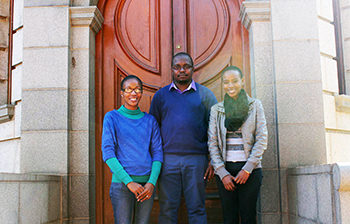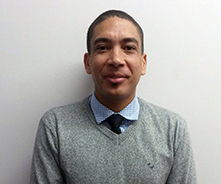Latest News Archive
Please select Category, Year, and then Month to display items
02 January 2025
|
Story Gerda-Marie van Rooyen
|
Photo Supplied
 Leading the research in South Africa is Prof Linus Franke from the Department of Soil, Crop and Climate Sciences.
Leading the research in South Africa is Prof Linus Franke from the Department of Soil, Crop and Climate Sciences.
Scientists are actively pursuing the successful breeding of diploid hybrid potatoes from inbred lines. This is expected to revolutionise potato breeding as it holds the key to rapid genetic progress. It will introduce new varieties for commercialisation through seed. Currently, existing potato variants have a gene that renders self-pollinated seeds infertile.
Prof Linus Franke, an academic in the Department of Soil, Crop and Climate Sciences at the UFS, is leading the research in South Africa. “This technology allows the production of genetically uniform potato seed that is easy to transport and largely disease-free.” He says this differs from conventional breeding whereby only vegetative propagation is possible due to tetraploid varieties in potatoes. It also risks carrying pests and diseases from one generation to the next – leading to the accumulation of pests and diseases with each round of multiplication.
Seed innovation
Prof Franke explains that Solynta BV, a seed company based in the Netherlands that produces potato varieties that can be grown from seed, has included South Africa in their research efforts because it is one of Africa’s largest producers and exporters. Through his academic relationship with Wageningen University and Research, a Dutch institution renowned for its agricultural endeavours and food production, the UFS became involved in researching hybrid potatoes grown from seed.
Diploid seeds containing two sets of chromosomes allow easier gene manipulation to increase predictability and speedier genetic progress. The breeding approach enables the incorporation of tolerance to pests, diseases, abiotic stresses (cold, heat, drought) and other desired genetic traits.
Although Prof Franke is optimistic about this research, he is not blind to disadvantages. “Potato seeds are tiny and have little energy reserves, making it harder to grow potatoes from seed than from tubers.” He says potatoes from seed will take longer to cultivate than tubers, as farmers need to grow plantlets from seeds first, adding six weeks to the growing period. “It is possible that commercial farmers can grow potatoes directly from seed. Alternatively, perhaps more likely, specialised growers will produce tubers of potatoes from seed; these tubers are then sold as seed tubers to other potato farmers, who then continue their normal practices of producing potatoes for the market from tubers.”
Financial benefits
Prof Franke says farmers have reason to get excited. “Seed potatoes will reduce input costs, as varieties with enhanced tolerance to pests and diseases require less pesticides. Planting one hectare of potatoes requires three to four tonnes of potato tubers, but only one 25 g packet of potato seeds.” Since potatoes are a more valuable commodity than maize, this technology might also increase farmers’ income potential.
nGAP lecturers welcomed by the UFS academic community
2016-06-30

University of the Free State’s newly-appointed nGAP
lecturers. From the left, Neo Mathinya,
Phumudzo Tharaga, and Kelebogile Boleu.
The University of the Free State (UFS) was allocated six positions as part of the Department of Higher Education and Training (DHET) New Generation of Academics Programme (nGAP). Four candidates have filled positions in the Faculty of Health Sciences, Faculty of the Humanities and the Faculty of Natural and Agricultural Sciences – with two positions still vacant.
According to Minister of Higher Education and Training, Dr Blade Nzimande, nGAP is part of the Staffing South Africa's Universities Framework, which focuses on the expansion of the size and compilation of academic staff at South African universities, especially with regard to transformation. The focus of the programme is the appointment of black and coloured candidates as well as women.
The Department of Soil, Crop, and Climate Sciences in the Faculty of Natural and Agricultural Sciences welcomed two nGAP lecturers, Phumudzo Tharaga and Neo Mathinya. The Faculty was allocated four positions. Two positions are filled, while two positions in the Department of Animal and Wildlife Sciences are almost ready to be filled with exceptional candidates.
Agrometeorologist with his feet on the ground
Phumudzo Tharaga holds an MSc from the UFS, and is currently pursuing a PhD. Tharaga’s research focuses on quantifying the water use efficiency of sweet cherry orchards under different climate conditions in the Eastern Free State. Tharaga will offer his students a wealth of practical experience, which he began accumulating while working at ABSA as an agro-meteorologist, before moving on to become a senior scientist at the South African Weather Service. In 2015, Tharaga became a research technologist at the Council for Scientific and Industrial Research (CSIR) and then returned to the UFS as an nGAP candidate at the beginning of 2016.

Beynon Abrahams, nGap lecturer
at the Faculty of Heath Sciences
Department of Basic medicine
Motivated scholar turned academic
Neo Mathinya, who hails from Taung in the North West, has made the UFS her home. She received both her undergraduate and honours degrees from the university. Apart from joining the department as a lecturer under the nGAP initiative, she is currently studying for her MSc in Soil Physics. She will continue with this research when she comes to her PhD. Mathinya’s research focuses on soil salinity - the process of increasing salt content - which affects the ability of plants to take up water, a process, known as osmotic stress. She will investigate the effects of irrigation water salinity on the grain yield and quality of malt barley.
Researcher with a passion for crime prevention
Kelebogile Boleu joined the Department of Criminology in the Faculty of Humanities, with a fresh take on diversion and crime prevention. Boleu holds a BA Criminology (Hons) and is now pursuing her Master’s degree. She worked for NICRO a non-profit organisation specialising in social crime prevention and offender reintegration, with programmes that prevent young and first-time offenders from re-offending, thus reducing crime. Boleu said that her practical experience makes her lectures to third-year criminology students exciting. Boleu’s research focuses on analysing the value of pre-sentencing reports in assisting adjudicators to make well-balanced judgments in cases.
Research with a winning plan for fight against breast cancer
Beynon Abrahams joined the Department of Basic Medical Sciences in the Faculty of Health Sciences. Abrahams holds a BSc, BSc (Hons), and MSc in Medical Biosciences from the University of the Western Cape. Abrahams’ Master’s research focused on breast cancer, research on which he is building in his PhD. This doctoral research involves the exploration of P-glycoprotein, a protein expressed on cancer cell and responsible for multi-drug resistance in cancer treatment. The aim of this research is to develop a therapeutic drug treatment strategy that will improve breast cancer patient survival outcomes. Abrahams’s greater vision is to look at conventional cancer therapeutic regimens, to find ways in which they can be improved.
The nGAP initiative offers these young lecturers an opportunity for growth and development as academics, while providing them with opportunities they would have not have been exposed to otherwise.